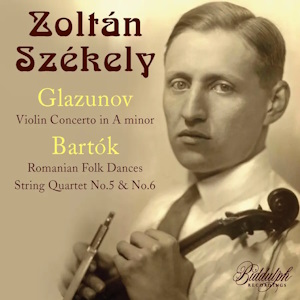
Zoltán Székely (violin)
Alexander Glazunov (1865-1936)
Violin Concerto in A, Op.82 (1904)
Béla Bartók (1881-1945)
Four (of Six) Romanian Folk Dances, SZ56 (1915, arr. Székely, 1925)
String Quartet No.5, SZ102, BB110 (1934)
String Quartet No.6, SZ114, BB119 (1939)
Hungarian String Quartet
Hague Residentie Orchestra/Willem van Otterloo
Géza Frid (piano)
rec. 1937-48
Biddulph 85048-2 [72]
Violinist Zoltán Székely (1903-2001), whose composition teacher was Kodály, is most famous for having commissioned Bartók’s Second Concerto, of which a performance of his, with Mengelberg, has survived. His name is also immortalised in the composer’s Romanian Dances, which Székely arranged for violin in 1925, and in receiving the dedication of the Second Rhapsody. Indeed, Székely and Bartók were active together in recitals for some time.
Biddulph’s release focuses on the violinist’s Decca 78s made in 1937 and 1942 and then adds post-war HMVs of the Hungarian String Quartet’s recordings of the Fifth and Sixth Bartok Quartets – Székely being the leader of this illustrious ensemble. He didn’t make many solo recordings which makes the Glazunov Concerto a rather unlikely object to record in 1942, and it was certainly bold of Decca to commit to it, not least because of Heifetz’s famous recording in 1934 with the LPO and John Barbirolli. Székely is a very different kind of performer from the incendiary Heifetz – as he is indeed from others associated at one time or another with this work, such as Milstein, Oistrakh, Morini and Candela – retaining an eloquent, slightly understated but warmly sympathetic approach. Van Otterloo and the Hague Residentie Orchestra provide excellent support – in fact they were so good that they re-recorded it later on LP with soloist Tamás Magyar, brother of Gabriel Magyar, cellist in a later iteration of the Hungarian Quartet. The Glazunov has been reissued in a Music & Arts box set devoted to the group but Biddulph has much better copies and their transfer has none of the clicks and rumbles that afflicted that earlier transfer. It’s preserved some characteristic Decca thistly surface noise, but the sound is open.
It’s a pity that only four of the Romanian Dances were recorded in 1937 on one side of a 78 (Nos. 1, 3, 4 and 6), with the fine pianist Géza Frid. The transcriber’s playing is stylish and thoroughly idiomatic, as one would expect. There was room for the other two on the second side with another small piece but Decca preferred to reserve that side for music by the Spanish violinist-composer Joan Manén, his Chanson (Adagietto). It’s not been included in Biddulph’s release, though there was room.
After the war came magnificent recordings of the last two string quartets which predate the first complete cycle of 1950 by the Juilliard Quartet. The Hungarians weren’t, though, the first to record the Fifth – that honour fell to the Kolisch in 1941 though their recording wasn’t issued at the time so the Hungarians were, effectively, the first to do so in practical terms. As for the Sixth, the Gertler Quartet had recorded it for Decca very slightly earlier. Nevertheless, the Hungarian Quartet’s credentials are second to none. They had worked on the Fifth with Bartók and are able to draw on the drive, drama and wit of the music presented in the composer’s five-movement arch format, with two inner slow movements separated by a bustly Alla bulgarese. The pianissimos in the second movement are memorably sustained, and the scherzo is a vivid exhibition of the ensemble’s rhythmic know-how. Listen, as well, to the pizzicati in the second slow movement, and what variations of colour the group brings. The tartly incisive finale with a truly deliciously played ’domestic’ panel – the so-called ‘tea shop’ moment – is wonderfully alive.
The companion work offers unremittingly gloomy challenges in each movement, which open ‘Mesto’. Recorded two years later, in 1948, the eerie and quiveringly intense elements of the quartet are conveyed with unbroken concentration. The sense of dislocation is finely and justly conveyed in a notably well recorded performance.
They were later to make their own complete cycle for DG, though with changed personnel, and that Music & Arts box also has live 1961 performances of both the Fifth and Sixth Quartets, recordings that augment the recorded cycle very well, as indeed they do this one.
The transfers here have been carried out extremely well and Tully Potter’s notes are characteristically fine. No Bartók lover should really be without examples of the Hungarian Quartet’s performances.
Jonathan Woolf
Buying this recording via a link below generates revenue for MWI, which helps the site remain free



















